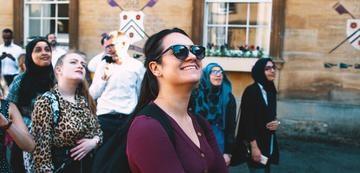Equality, Diversity, & Inclusion (EDI)

Simply put, we want to recruit the most talented and qualified students and staff. We value diversity and want every one of our students and staff to feel comfortable and that they belong.
The richness of perspectives and experiences of all our members strengthens our research and enhances our teaching. The Doctoral Training Centre places Equality, Diversity, and Inclusion (EDI) at the heart of all our activities. Our policies and practices are fully embedded at all levels, from leadership and staffing to student recruitment, retention, attainment, progression and wellbeing. We include training on Implicit Bias in our Induction Week. We already benefit from the extensive equality and diversity framework and strategy in place at the University of Oxford, being underpinned by the University’s Equality Policy. The Equality Policy provides for an open and inclusive environment, that:
'promotes equality, values diversity and maintains a working, learning and social environment in which the rights and dignity of all its staff and students are respected.’
We proposed what was to become the UNIQ+ Graduate Access Summer Internship programme in 2019. UNIQ+ gives talented current undergraduates who are curious about research, but who come from backgrounds underrepresented at Oxford, a chance to experience a Summer research internship at the University of Oxford. UNIQ+ was supported by the SABS R3 Programme, the BBSRC Interdisciplinary Science Doctoral Training Partnership and the Nuffield Department of Medicine, and proved to be a great success, accepting 33 graduates, some of whom have subsequently been accepted onto doctoral programmes at Oxford. UNIQ+ has continued to grow in 2020, although the COVID-19 pandemic meant it has become UNIQ+ Digital, an online programme in 2020. If you're curious about research and what it would be like at Oxford, have a look at UNIQ+.
Access the university's calendar of EDI events and dates to be aware of.
If you would like to get in touch about anything related to EDI at the DTC, don’t hesitate to contact us.
Funding
Academic Futures Scholarships
Academic Futures is a series of scholarship programmes that seeks to address under-representation and help improve equality, diversity and inclusion in our graduate student body. The University relies on bringing the very best minds from across the world together, whatever their race, gender, religion or background to create new ideas, insights and innovations to change the world for the better.
You can learn more about this funding including how you can apply here.
Resources
Disability, Neurodiversity and Wellbeing
The DTC works closely with the University Disability Service, the Student Welfare Services Team and Occupational Health Service to provide support for staff and students with physical and/or mental disabilities or who are neurodiverse.
The DTC Head of Administration and Finance acts as Welfare Advisor and Disability Contact and attends regular seminars and training in all areas. All First Year students with a registered disability will be invited to have an informal 1-to-1 meeting with the Head of Administration and Finance when they arrive to discuss their requirements and enable effective support from the outset.
For more information, contact:
- University Disability Advisory Service (for Students)
- Students: disability@admin.ox.ac.uk
- Support for Disabled Staff
- Support for Disabled Visitors
- Neurodiversity and New Accessibility Standards
Wellbeing
- Oxfordshire Mind offer advice about Coronavirus and Your Wellbeing.
- The University of Oxford's Student Union (Oxford SU) offer Wellbeing Walks in the University Parks during Weeks 1-8 — with some friendly college dogs.
Diversity Training Materials
There are a variety of training courses and materials available both within and beyond Oxford. It’s well worth checking out the Implicit Association Tests from Harvard, to help make ourselves aware of our own implicit biases.
Within Oxford
- Training, including:
- Equality and Diversity Briefing;
- Implicit Bias;
- Race Awareness;
- LGBT+ Role Models, Mentoring & Allies;
- Pivot: Mentoring Scheme For BME Staff;
- Harassment & Bullying Training; and
- Recruitment and Selection.
There is also general Information and newsletters from the University of Oxford Equality & Diversity Unit.
Outside Oxford
- Royal Society Report on the diversity of the UK Scientific Workforce.
- Harvard has some great online tests that reveal our own implicit bias:
- There are a couple of good videos worth watching too, from the:
Gender
The Athena SWAN Charter recognizes good practice in promoting gender equality in higher education. The University of Oxford was a founder member of the Athena Charter and has held an institutional award since 2006.
Going through the Athena SWAN application process gives universities and departments the space to reflect on, and celebrate, current organizational and cultural practices that promote gender equality. Athena SWAN also offers a valuable framework for introducing cultural changes that create a better working environment for both men and women.
There are a variety of resources available both within and beyond Oxford:
Within Oxford
- There are lots of Women’s Societies in the Departments of the University: see the MPLS ED&I page, including The Oxford Women in Physics Society.
- Springboard, an award-winning personal and professional development programme, designed and developed by women for women.
- OxFEST, an University of Oxford society for women studying or working in engineering, science, and technology.
- Oxford Women’s Network, committed to enhancing the quality of life for the community of women within the collegiate University and their Oxford Women’s Newsletter (OWN), which is published fortnightly during term time and once a month during the long vacation. It contains a round-up of news, resources and events, and celebrates the achievements of women at Oxford. Items for inclusion should be emailed to gender.equality@admin.ox.ac.uk. Subscribe here.
- Various skills courses including those including the Oxford Women’s Development Programme run by the Mathematical, Physics and Life Science Division.
- There is also the RisingWISE programme for enterprising women: the University accepts some DPhil students on this programme.
Oxford Senior Women’s Mentoring Network (OxSWMN).
Outside Oxford
Mental Health and Wellbeing
Part of fostering a nurturing environment is provision for health concerns, including physical and mental: either can affect anyone at any time.
A signposting session within the DTC’s Induction Programmes for new students is delivered by Student Welfare and Support Services, covering areas within the remit of the Counselling Service, the Disability Advisory Service, the Student Resolution Service and the Colleges with a further refresher drop-in session offered to students entering the substantive research phase of the programme in Year 2.
In 2018 the University signed up to the Mindful Employer's Charter for Employers Who Are Positive About Mental Health and is now revising and implementing an Oxford-specific action plan for developing a culture that is more supportive of staff mental health, alongside support for student mental health.
The University also provides a range of self-help, local and online resources and mental health resources.
For information about coronavirus (COVID-19) in the 2020-21 academic year, please refer to the student pages of the COVID-19 Response site.
Parents and Carers
Besides looking after ourselves, some of us have additional caring responsibilities. If any students or staff would like to discuss any issues regarding maternity, paternity, shared parental leave, other caring responsibilities, or HR matters, etc., please get in touch with Samantha Taylor in the first instance.
Within Oxford
- Support for parents and carers including a Childcare Services and information on financial support for returning carers.
LGBTQIA+
The University of Oxford’s LGBTQ+ Society is the second largest society at the University, and the largest higher education LGBTQ+ Society in the country. It is a welfare society that aims to cater for all students’ needs. There is also a very active LGBT+ Staff Network.
For staff, the University has a range of networks and support which can be accessed here:
Race
The University of Oxford holds the Bronze Race Equality Charter Award. The Race Equality Working Group provides a forum for discussion and consultation across the University. A range of networks and resources can be accessed via the links below.
- BME Staff Network.
- Workshops and training.
- Mentoring scheme for BME staff.
Religion and Belief
The University’s Equality and Diversity Unit’s page on Religion and Belief lists various societies, and also information about University prayer spaces.
Students and members of staff will find that there is a wide variety of places of worship within the University and in and around the City Centre. For details see the faith societies and belief group webpage.
The EDU’s equality calendar includes details of religious festivals for which staff might reasonably request leave.
Sexual Harassment and Violence
The University provides professional support for students who have experienced sexual harassment and violence. For more information, contact:
Student Welfare and Support Services
3 Worcester Street
Oxford, OX1 2BX
☏ 01865 270300
✉︎ swss@admin.ox.ac.uk
More information can be found here:
- Sexual Harassment and Violence Support Service
- Surviving traumatic events: Counselling Service resources
- Oxfordshire Sexual Abuse and Rape Crisis Centre
Contacts
Like the rest of the University, the DTC does not tolerate bullying, harassment or victimization of any kind. There is a Harassment Advisor network, and you can read about the University’s Harrassment Procedure if the person who is the subject of the complaint is a member of University staff, or a student.
If you’d like to discuss harassment of any kind, please get in touch with Samantha Taylor <samantha.taylor at dtc.ox.ac.uk>, DTC Head of Administration and Finance.
There is also a Harassment Advisory Service if you’d like to speak with someone outside the DTC, email harassment.line@admin.ox.ac.uk.



